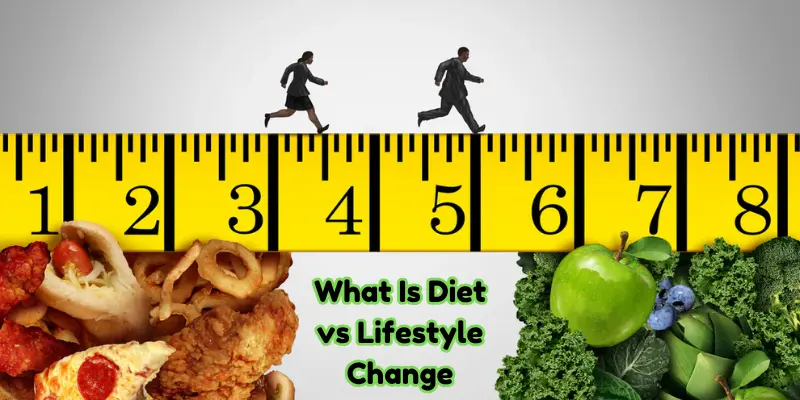Diet vs Lifestyle Change | Web Gege
Updated: 04 Apr 2025
When it comes to improving our health, two terms often come up diet and lifestyle change. While both aim to make us healthier, they approach the goal in different ways. A diet usually focuses on what we eat, often with the goal of losing weight or boosting energy in the short term. On the other hand, a diet vs lifestyle change is a more comprehensive approach, involving changes to not only your eating habits but also your physical activity, sleep, and even stress management.
In this article, well compare diet vs lifestyle change to help you understand the key differences, the benefits of each, and why a diet vs lifestyle change might be a more sustainable choice in the long run. Whether you are looking to lose weight, improve your overall health, or just live a more balanced life, understanding how to make the right choice for you is the first step.
What Is Diet vs Lifestyle Change?
When people talk about getting healthier, they often mention two things: diet and diet vs lifestyle change. Lets look at what each one means.
A diet is usually about changing what you eat. It might mean eating certain foods and avoiding others, like eating more vegetables or cutting out junk food. People go on diets when they want to lose weight or feel healthier for a short time. But once the diet is over, they might go back to their old eating habits.

A lifestyle change, on the other hand, is about making bigger changes to how you live every day. This includes what you eat, but also things like how much exercise you get, how well you sleep, and how you manage stress. A lifestyle change is about creating healthy habits that you keep for the rest of your life, not just for a few weeks.
Diet is more like a temporary change in eating, while a diet vs lifestyle change is a long term, overall way of living healthier.
You May Also Visit This Link: Sarasota Business Observer
Why is Diet vs Lifestyle Change Important?
Understanding the difference between a diet and a diet vs lifestyle change is important because it helps us make better choices for our health.
1. Long Term Health
- Diet is usually temporary and might help you feel better for a short time, but it is not a permanent solution.
- Lifestyle change focuses on lasting habits that keep you healthy for the rest of your life.
2. Sustainable Results
- Following a strict diet can be hard to stick with, and once its over, you may gain back any weight or habits you lost.
- With a diet vs lifestyle change, small, steady improvements are easier to maintain and keep you on track long term.
3. Better Overall Wellbeing
- A diet only focuses on food, but it does not include important areas like exercise, sleep, and mental health.
- A lifestyle change considers your whole life helping you eat better, move more, rest properly, and stay happy.
4. Personal Empowerment
- Dieting can sometimes feel like a “quick fix” where you are forced to follow strict rules.
- Lifestyle changes let you make choices that work for your body and mind, giving you more control over your health.
5. Health Beyond Weight
- A diet may focus mainly on weight loss or eating certain foods.
- Lifestyle change goes beyond weight it helps improve your energy, mood, and overall health.
This section emphasizes the importance of choosing a sustainable and long term approach to health, which can be more beneficial than focusing solely on temporary diets. Let me know if you would like any changes.
Step-by-Step Guide: Diet vs Lifestyle Change

Making healthier choices can be tricky, but knowing whether you should follow a diet or make a lifestyle change can make a big difference. Here is a simple guide to help you decide what is best for you.
Step 1: Understand Your Goal
- Diet: If you have a specific short term goal, like losing a few pounds before an event or feeling better quickly, a diet might work for you.
- Lifestyle Change: If you want long lasting results and a healthier lifestyle overall, a lifestyle change is the way to go.
Step 2: Evaluate Your Current Habits
- Diet: Take a look at your eating habits. Are there certain foods you can cut back on or replace with healthier options? A diet often focuses on food choices.
- Lifestyle Change: Think about your daily habits food, exercise, sleep, and stress management. A lifestyle change focuses on improving all of these areas, not just your diet.
Step 3: Start Small
- Diet: If you choose a diet, start with small changes. For example, replace soda with water or add more fruits and vegetables to your meals.
- Lifestyle Change: For a lifestyle change, begin by incorporating small habits, like walking every day, getting 8 hours of sleep, or reducing stress through relaxation techniques.
Step 4: Make It Realistic
- Diet: Pick a diet plan that fits into your life and is easy to follow. Do not choose something too extreme that you can not keep up with.
- Lifestyle Change: Choose habits that feel manageable and enjoyable. The more realistic and fun they are, the easier it will be to stick to them.
Step 5: Track Your Progress
- Diet: Keep track of your meals, calories, or any other diet related goals. Seeing progress can motivate you to continue.
- Lifestyle Change: Track your overall health journey, not just your weight. Monitor things like your energy levels, mood, and how often you exercise.
Step 6: Stay Consistent
- Diet: Stay consistent with your diet plan, but allow yourself some flexibility. Occasional treats are okay, as long as you stick to the plan most of the time.
- Lifestyle Change: Consistency is key for long term success. Even when life gets busy, try to maintain healthy habits like eating well, exercising, and managing stress.
Step 7: Reflect and Adjust
- Diet: After completing a diet plan, reflect on what worked and what did not. If you achieved your goal, consider how to maintain it.
- Lifestyle Change: With a lifestyle change, reflect regularly on how your habits are improving your overall health. Do not be afraid to make adjustments as needed to keep things working for you.
Step 8: Focus on Balance
- Diet: A diet can help you temporarily adjust your eating habits, but remember to think about balance in the long term.
- Lifestyle Change: A lifestyle change is all about balance making sure you are taking care of your body and mind in every way, every day.
This guide helps you make an informed decision about whether a diet or lifestyle change is better for you and shows you how to get started on either path.
You May Also Visit This Link: Cavalier Finance
Advantages and Disadvantages of Diet vs Lifestyle Change
When it comes to staying healthy, we can choose between diets and lifestyle changes. Each has its good and bad sides. Lets explore both to see what works best for you.
Benefits of Diet
| Pros |
| Quick Results Advantage: Diets can lead to rapid changes, such as weight loss or improved energy, in a short amount of time. Why its helpful: If you need to see fast results for a specific event or reason, a diet might be your best option. |
| Focused Approach Advantage: Diets often target specific goals like weight loss, improved nutrition, or reducing certain health risks (e.g., high blood pressure). Why its helpful: If you have a clear, short term goal, diets can give you a structured plan to achieve it. |
| Variety of Options Advantage: There are many types of diets available (e.g., keto, Mediterranean, plant based), so you can choose one that fits your preferences. Why its helpful: You can pick a diet that aligns with your lifestyle, food preferences, and health goals. |
Drawbacks of Diet
| Cons |
| Temporary Results Disadvantage: Diets are often short term fixes, and once you stop, you might regain the weight or fall back into unhealthy eating habits. Why it is a challenge: Diets are hard to maintain over time, which can lead to the “yo yo effect” where weight goes up and down. |
| Restrictive Disadvantage: Many diets can be restrictive, cutting out whole food groups or limiting food choices. Why it is a challenge: This can lead to frustration, cravings, or even nutrient deficiencies if not done carefully. |
| Can Cause Stress Disadvantage: Focusing too much on what you can not eat can create stress around food and lead to unhealthy relationships with eating. Why it is a challenge: Diets can feel like a constant battle, making it harder to enjoy food. |
Benefits of Lifestyle Change
| Pros |
| Sustainable Results Advantage: Lifestyle changes focus on creating long term habits, leading to lasting health benefits like steady weight loss, improved fitness, and better mental health. Why its helpful: Lifestyle changes are easier to maintain over time, helping you stay healthy for life. |
| Holistic Approach Advantage: Lifestyle changes involve more than just eating better they also include regular exercise, better sleep, and stress management. Why its helpful: This all around approach leads to better overall health, not just improved eating habits. |
| Flexibility Advantage: Unlike strict diets, lifestyle changes allow you to make gradual improvements and adapt them to your own preferences and schedule. Why its helpful: You can make small changes that work for you and are easier to stick with in the long run. |
| Mental Wellbeing Advantage: Adopting a healthy lifestyle, rather than focusing on restrictive eating, can help you feel more positive about your health journey. Why its helpful: Lifestyle changes encourage a balanced, healthier mindset and reduce stress around food and exercise. |
Drawbacks of Lifestyle Change
| Cons |
| Takes Time Disadvantage: Lifestyle changes take longer to show results compared to a quick diet plan. Why it is a challenge: If you are looking for immediate results, lifestyle changes can feel slow and less rewarding at first. |
| Requires Consistency Disadvantage: Making permanent changes requires a lot of consistency and discipline in many areas of life, such as eating, exercise, and sleep. Why it is a challenge: It can be difficult to stay committed, especially if you are juggling other responsibilities. |
| Harder to Track Progress Disadvantage: Unlike diets, which often have clear, measurable goals (like calories or weight), lifestyle changes can be harder to track. Why it is a challenge: Without concrete numbers or short term milestones, it can feel like progress is slow or unclear. |
Each has its place, depending on your needs and what you are looking to achieve. Understanding the pros and cons of both can help you make the best decision for your health.
Common FAQs About Diet vs Lifestyle Change
Want to know the difference between diet and lifestyle change? Lets explore some common questions to help you understand how they work for a healthier life.
Diet is usually about changing what you eat for a short time, often to lose weight or improve health quickly.
Lifestyle change is about making long term changes to your eating, exercise, sleep, and other daily habits for a healthier life overall.
Yes, diets can help you lose weight in the short term, but they might not keep the weight off for long. Once you stop the diet, you may return to old habits and gain the weight back.
Lifestyle change is better for long term health. It focuses on creating healthy habits you can keep forever, while diets are usually short term fixes.
Start with small steps, Begin by eating more fruits and vegetables, exercising a little every day, getting enough sleep, and finding ways to manage stress. Gradually build these habits into your life.
Yes, You can follow a diet plan while also making lifestyle changes. Just remember, a diet should be part of a broader, balanced approach to health that includes exercise, sleep, and stress management.
Diets can fail because they are often restrictive or too hard to stick with. Once the diet ends, people may go back to their old habits, leading to weight gain or unhealthy eating.
Yes, a lifestyle change can help you lose weight, but it will be gradual. The focus is on improving overall health, which often leads to steady and lasting weight loss over time.
Keep track of your progress, set small and achievable goals, and celebrate your successes. Find activities and healthy habits you enjoy so that they become part of your daily routine.
Results from lifestyle changes may take longer to show, but they are more lasting. You may start feeling better and seeing small improvements in your health within a few weeks, but big changes might take months.
If you go back to old habits after a diet or lifestyle change, you might lose the progress you have made. Its important to continue with healthy habits to maintain your results and feel your best.
Conclusion
Choosing between a diet and a lifestyle change depends on your goals. If you are looking for quick results, a diet might help, but for long term health and lasting results, a lifestyle change is the way to go.
Remember, lifestyle changes focus on making healthier habits part of your everyday life, like eating better, exercising, and managing stress. Both approaches can work, but the key is consistency and finding what fits best for you. Make small, steady improvements, and you well feel the benefits in the long run.
Bonus Points About Diet vs Lifestyle Change
Making changes to your diet and lifestyle can help you feel better and stay healthy. Lets explore the difference between eating right and living well every day.
- Do not Rush: Whether you choose a diet or lifestyle change, take it one step at a time. Quick fixes do not always last, but small, consistent changes lead to lasting success.
- Enjoy the Journey: Make the process fun. Try new healthy recipes, explore different workouts, and celebrate your progress no matter how small. It is all about enjoying the healthy habits you are creating.
- Balance is Key: Whether you are dieting or changing your lifestyle, balance is crucial. Do not be too hard on yourself. Enjoy a treat once in a while or skip a workout when life gets busy. Its about finding a healthy balance that works for you.
- Support Makes a Difference: Find a friend, family member, or group to share your health journey with. Having support can make it easier to stay on track and motivate each other.
- Keep Learning: Stay curious about new ways to improve your health, from new exercises to mindfulness practices. Knowledge is power, and it can help you stay motivated on your journey.
These bonus tips can help you stay on track and make your health journey enjoyable and sustainable.
You May Also Visit This Link: BestBuy Gadgets





